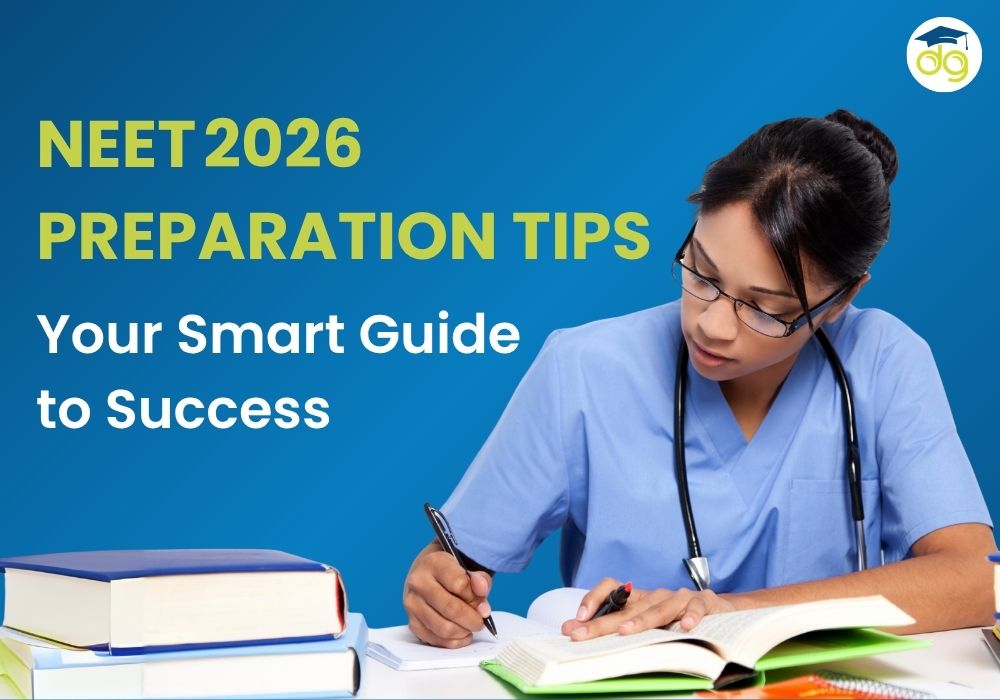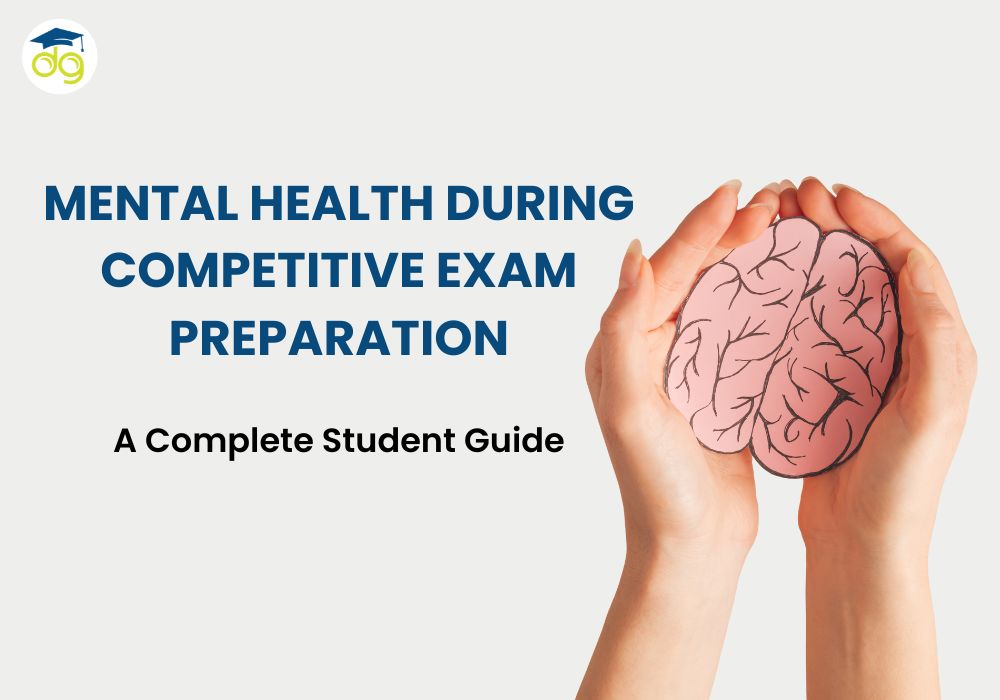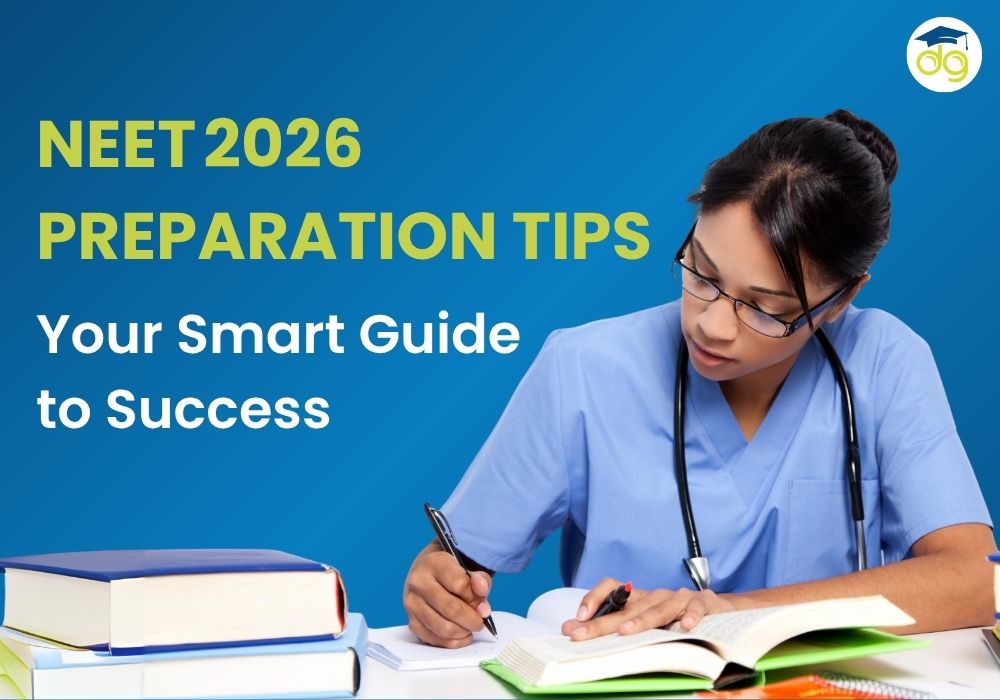NEET 2026 Preparation Tips: Smart Study Plan for Top Scores
Crack NEET with a practical plan, smart study tips, and mock test tools.
Lakhs of students every year appearing for NEET 2026 are caught in a dilemma: how do I give my best? Thoughts keep going in loops: "Am I studying enough theory?", "What and when should I practice next?", "Can I actually improve upon a bad mock score?"
This blog is yours—someone sitting for NEET 2026, and famished not just for study material, but also for a plan, realistic motivation, and honest advice. You'll get simple NEET 2026 study tips, a step-by-step NEET study guide, NEET study guidelines, and reminders on cracking NEET best. Everything is written in plain English, with no fluff. Simple help that you can apply today and every day up to the exam.
Why NEET 2026 Preparation Needs a Plan
NEET—National Eligibility cum Entrance Test—is the only door for MBBS and BDS admissions into government and majority of private medical colleges in India. Registrations would go up to 20 lakh candidates in previous years. The figures will go even higher for 2026. In such merciless competition, strategy is all.
Exam Pattern and Syllabus Overview
Understanding the NEET pattern is the first step in smart preparation:
- Total questions: 200 (45+45 Physics and Chemistry, 90 Biology)
- Questions to attempt: 180
- Marking scheme: +4 for each correct answer, −1 for each wrong answer
- Time limit: 200 minutes
- Syllabus: NCERT-based, covering Class 11 and 12 for Physics, Chemistry, Biology
The exam structure rewards accuracy, strong concepts, and time management. Hence, your NEET study plan must prioritise these areas.
Why This Blog Matters Now
With NEET 2026 in May 2026, time becomes the essence. Most students are stuck in plateaus or do not have an idea of what to do next. This blog navigates you through the syllabus, creating a step-by-step preparation calendar, bypassing pitfalls, making use of the best resources, and gaining confidence—everything in a way that maintains the motivation levels high.
Building a Strong Foundation
Read the Syllabus Backwards and Forward
Download the original NEET 2026 syllabus from the National Testing Agency (NTA) official portal. Refer to it constantly.
Categorise your study material by topic:
- Physics: Mechanics, Thermodynamics, Electrodynamics, Modern Physics, etc.
- Chemistry: Physical, Organic, Inorganic
- Biology: Botany and Zoology—with greater emphasis being laid on Plant Physiology, Reproduction, Genetics, Human Physiology, Ecology, and Biotechnology
Make a checklist using the syllabus. Nothing is left to chance.
Focus on the NCERT First
NCERT textbooks for Class 11 and 12 Biology, as well as Chemistry and Physics, form the backbone of NEET. Statistics show that approximately 80–90% of Biology questions are directly from the NCERT.
Start by doing the following:
- Read every line carefully
- Underline or highlight key points
- Make your own short notes and flashcards
- Revisit NCERT at least three times—once for preparation, once for revision, and once for pre-exam quick review
Set Up a Realistic Daily Timetable
You don’t need to study 12 hours a day to crack NEET 2026. Instead, aim for 6–8 focused hours daily, including school or college.
Create daily study blocks like this:
- 2 hours—Biology (theory + notes)
- 1.5 hours—Physics (concepts/practice)
- 1.5 hours—Chemistry (concepts/practice)
- 1 hour—Revision/flashcards/mock questions
- 1 hour—Rest, breaks or light activity
Stick to the schedule at least 90% of the time. Discipline is more important than hours.
Structured Study Plan – Three Phases
Phase 1: Foundation Building (July – December 2024)
Goal: Complete Class 11 content thoroughly.
- Read the NCERT line by line for Biology, Chemistry, and Physics
- Solve topic-wise MCQs from trusted sources
- Write short notes and organise them subject-wise
- Revise weekly using topic-wise notes
- Take a monthly topic test (Physics, Chemistry, Biology)
This phase builds conceptual clarity and sets a strong base.
Phase 2: Strengthening + Mock Practice (January – September 2025)
Goal: Cover Class 12 content and integrate practice.
- Finish the NCERT Class 12 syllabus
- Use reference books like DC Pandey (Physics), GRB Objective Chemistry, and MTG BIO Vol 1 & 2
- Begin intermediate-level mock tests and previous years’ questions
- Analyse errors and refine notes
- Start full-length mock tests by July 2025
Your confidence grows during this phase as knowledge meets practice.
Phase 3: Revision & Final Push (October 2025 – April 2026)
Goal: Complete revision cycles and sharpen test strategy.
- Revise the entire syllabus 3–5 times
- Take 2–3 mock tests per week
- Analyse mistakes immediately and fix weak areas
- Work on time management—attempting papers in 200 minutes
- Use portable notes/flashcards for last-minute recaps
This phase converts your preparation into performance.
Study Techniques & Smart Strategies
Break Subjects into Chunks
Divide topics into parts:
- For example, Physical Chemistry could be “Chemical Equilibrium and Thermodynamics” in March, “Electrochemistry” in April
- Finishing small chunks helps avoid burnout
Visual Learning Works
Use diagrammatic tools:
- Flowcharts and mind maps for topics like “Cell Division” or “Chemical Kinetics”
- Highlight keywords and colour-code concepts
- Review these visuals periodically (weekend revision)
You’ll remember diagrams better than plain text.
Practice Makes You Stronger
- Solve MCQs daily, topic-wise at first
- Pick a reliable test series by July 2025
- Keep a score of performance and timing
- Practice previous years’ NEET papers
Accuracy backed by speed—not guessing—will drive your results.
Make Weekly Revision Time
Set aside 2–3 hours weekly to revise what you studied over the week. This reinforces learning and identifies weak areas early.
Track Your Progress—Visually
Maintain a chart or table:
Date | Topic Covered | Score (%) | Time Taken | Notes |
| 05-Aug-24 | Electrochemistry | 70 | 45 mins | Revise ions |
| 06-Aug-24 | Plant Physiology | 85 | 30 mins | Good |
Track which topics you excel in and which ones need more revision.
Stay Physically and Mentally Well
- Sleep 7–8 hours nightly
- Stay hydrated: 2–3 litres of water daily
- Take short breaks—stretch your legs, walk, breathe
- Avoid social media overload—limit to 30 minutes/day
- Talk to parents/friends if you’re feeling stressed
NEET prep is long. Your physical and mental well-being needs positive habits just as much as study.
Common Mistakes or Challenges
Mistake 1: Skipping NCERT, Jumping to Coaching Notes
Reality: Most NEET questions come from the NCERT. Without mastering the NCERT, you lose easy marks.
How to avoid it: Finish the NCERT first. Annotate and revise until every page feels familiar.
Mistake 2: Using Too Many Books at Once
Why it happens: Students think that more books mean more knowledge. Instead, it causes confusion.
How to avoid it: Stick to one main book per subject (NCERT + one reference book). Use a second only for deep dives or backups.
Mistake 3: Mock Tests Without Analysis
It's easy to take tests but ignore mistakes. Without proper review, you repeat errors.
How to avoid it: Maintain an “error bank.” For every test, note down the mistake, understand it, and fix it within a weekly review.
Helpful Tips or Study Resources
Time Management
- Use a timer app while solving practice sets
- Train to complete Biology in 90 minutes, Physics and Chemistry in the remaining 110 minutes
- Keep 15–20 minutes at the end to review answers
Revision Techniques
Flashcards
- Physics formulas, Chemistry reactions, Biology definitions
- Carry small packs to review while travelling
Mind Maps
- Useful for chapters like Reproduction, Genetics
Error Correction
- Maintain an error log, revisit weekly
Recommended Tools and Resources
Books and Materials
- NCERT Biology (Class 11 & 12)
- NCERT Chemistry & Physics
- DC Pandey Class 11 & 12
- Objective Chemistry by GRB / MTG
- MTG NCERT At Your Fingertips Biology Vol 1 & 2
Online Platforms & Test Series
- Unacademy NEET, Vedantu Biotonic (YouTube channels)
- NEETPrep, Embibe, Toppr (apps)
- Skoodos Bridge – Your go-to platform for study plans, mentoring and guided practice
Study Aids
- Highlighter pens
- Portable flashcards
- Diagram charts (e.g., for human anatomy)
FAQ Section
Q1. Is it feasible to crack NEET 2026 through self-study?
Yes. Numerous students clear without coaching. You just need a systematic study schedule for NEET, determined hard work, and routine mock practice.
Q2. How many daily hours should I study?
Look at 6–8 hours of intense study per day. Gradually reduce marginally if you have school or board exam responsibilities. It is not the number of hours but the quality.
Q3. When should I start attempting full-length mock tests?
By Jul-Aug 2025, start mock tests and old year question papers. More frequency in Phase 3 (Oct 2025 – Apr 2026).
Q4. Which subject is scoring?
Biology is the most scoring subject with 90 questions. With a strong NCERT base, scoring more than 80% in Biology is very likely.
Q5. What do I do if I get a poor test score?
Go through your errors as soon as possible, identify the cause of the errors, cover the topics again, and practice similar problems. Make it a learning experience, not a failure.
Conclusion
Let's summarise the key points:
- Master the NEET 2026 syllabus and use the NCERT to the maximum possible extent
- Practice daily—6 to 8 uninterrupted hours
- Implement a 3-step approach to construct, reinforce, and refer
- Make use of intelligent strategies such as weekly review, flashcards, and mock analysis
- Prevent errors such as failing to make references to the NCERT or omitting the test revision
- Keep your equilibrium—sleep adequately, eat properly, and rest
- Utilise original sources and portals, such as Skoodos Bridge, for planning and assistance
The most prudent means of cracking NEET is to work smarter, rather than harder. It's a long journey, but gradual day-by-day progress generates tremendous momentum.
You’ve already taken the hardest step—you’ve shown up and read this blog. Keep going. Your dedication today will shape your success tomorrow.
For personalised study plans, exclusive revision materials, and expert exam guidance, visit Skoodos Bridge. Check out our resources, join a community of focused learners, and stay on the track that leads to success in NEET 2026.
Categories
Archives
- July 202515
- June 202524
- May 202526
- April 202530
- March 202523
- February 202513
- January 202523
- December 202429
- November 20246
- September 20245
- August 202422
- July 202415
- May 20249
- June 202424
Similar Posts

NEET 2026 Preparation Tips: Smart Study Plan for Top Scores
by Skoodos bridge

Mental Health Tips for Competitive Exam Prep: A Student’s Guide
by Skoodos bridge

Career Paths After Government Exams: Beyond IAS & Bank PO Roles
by Skoodos bridge

Language Certifications: A Must-Have for Studying Abroad in 2025
by Skoodos bridge

How AI is Revolutionizing Competitive Exam Preparation in 2025
by Skoodos bridge

How to Balance Board and Competitive Exam Prep Effectively
by Skoodos bridge

Online vs Offline Coaching: Which is Better for Exam Success?
by Skoodos bridge

Top 10 CLAT Coaching Institutes in Raipur for Law Aspirants
by Skoodos bridge

Top 7 Exams After 12th Commerce for High-Salary Career Options
by Skoodos bridge


Leave a Comment